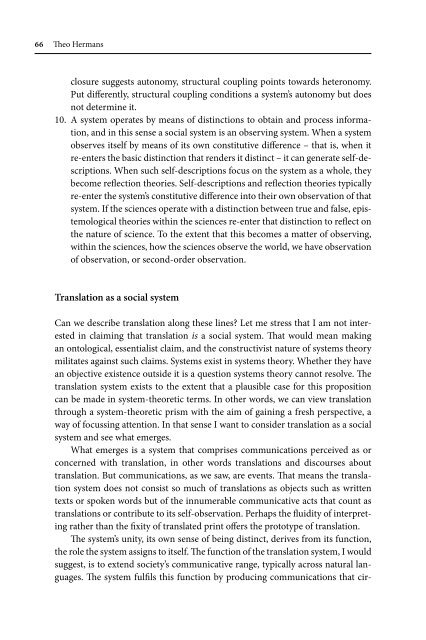Constructing a Sociology of Translation.pdf
Constructing a Sociology of Translation.pdf
Constructing a Sociology of Translation.pdf
- No tags were found...
Create successful ePaper yourself
Turn your PDF publications into a flip-book with our unique Google optimized e-Paper software.
Theo Hermansclosure suggests autonomy, structural coupling points towards heteronomy.Put differently, structural coupling conditions a system’s autonomy but doesnot determine it.10. A system operates by means <strong>of</strong> distinctions to obtain and process information,and in this sense a social system is an observing system. When a systemobserves itself by means <strong>of</strong> its own constitutive difference – that is, when itre-enters the basic distinction that renders it distinct – it can generate self-descriptions.When such self-descriptions focus on the system as a whole, theybecome reflection theories. Self-descriptions and reflection theories typicallyre-enter the system’s constitutive difference into their own observation <strong>of</strong> thatsystem. If the sciences operate with a distinction between true and false, epistemologicaltheories within the sciences re-enter that distinction to reflect onthe nature <strong>of</strong> science. To the extent that this becomes a matter <strong>of</strong> observing,within the sciences, how the sciences observe the world, we have observation<strong>of</strong> observation, or second-order observation.<strong>Translation</strong> as a social systemCan we describe translation along these lines? Let me stress that I am not interestedin claiming that translation is a social system. That would mean makingan ontological, essentialist claim, and the constructivist nature <strong>of</strong> systems theorymilitates against such claims. Systems exist in systems theory. Whether they havean objective existence outside it is a question systems theory cannot resolve. Thetranslation system exists to the extent that a plausible case for this propositioncan be made in system-theoretic terms. In other words, we can view translationthrough a system-theoretic prism with the aim <strong>of</strong> gaining a fresh perspective, away <strong>of</strong> focussing attention. In that sense I want to consider translation as a socialsystem and see what emerges.What emerges is a system that comprises communications perceived as orconcerned with translation, in other words translations and discourses abouttranslation. But communications, as we saw, are events. That means the translationsystem does not consist so much <strong>of</strong> translations as objects such as writtentexts or spoken words but <strong>of</strong> the innumerable communicative acts that count astranslations or contribute to its self-observation. Perhaps the fluidity <strong>of</strong> interpretingrather than the fixity <strong>of</strong> translated print <strong>of</strong>fers the prototype <strong>of</strong> translation.The system’s unity, its own sense <strong>of</strong> being distinct, derives from its function,the role the system assigns to itself. The function <strong>of</strong> the translation system, I wouldsuggest, is to extend society’s communicative range, typically across natural languages.The system fulfils this function by producing communications that cir-
















